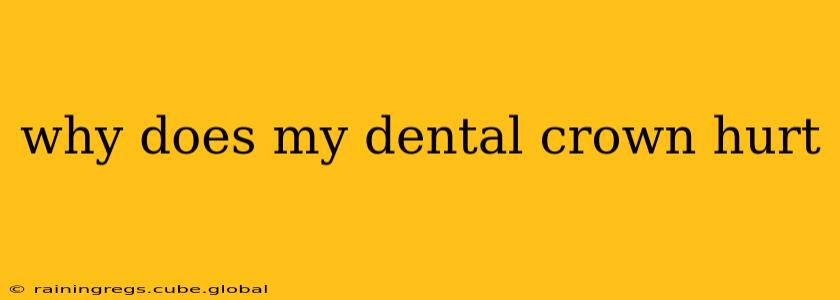A dental crown, while designed to protect and strengthen a damaged tooth, can sometimes cause discomfort. Understanding the reasons behind crown pain is crucial for addressing the issue promptly and effectively. This comprehensive guide explores the various causes of crown pain and provides insights into potential solutions.
What are the Common Causes of Crown Pain?
Crown pain can stem from a variety of factors, ranging from minor irritations to more serious underlying problems. Let's explore some of the most common culprits:
Is it normal to have some sensitivity after getting a crown?
Yes, some degree of sensitivity, particularly to temperature changes (hot and cold), is common immediately following crown placement. This usually subsides within a few days or weeks as the gums heal and adjust to the new restoration. However, persistent or worsening sensitivity warrants a visit to your dentist.
Could the crown be loose or ill-fitting?
A loose or ill-fitting crown can lead to discomfort. Food particles can become trapped under the crown, irritating the gum tissue and causing pain, sensitivity, or even infection. In addition, a loose crown can shift, leading to further damage to the underlying tooth structure.
Could it be an infection or gum disease?
Inflammation or infection around the crown (peri-coronitis) is a potential cause of pain. Poor oral hygiene or the presence of bacteria can contribute to gum disease, leading to swelling, redness, and pain around the crown. This can also manifest as a dull ache or throbbing sensation.
Could there be decay underneath the crown?
Despite the protective nature of a crown, decay can sometimes occur under the restoration. This is especially true if the tooth wasn't properly prepared before the crown was placed or if there was pre-existing decay. The pain may be sharp, throbbing, or persistent.
Could the crown be irritating my gums?
The crown's margins (edges) might be slightly irritating the gums, causing inflammation and discomfort. This can lead to pain, swelling, and sensitivity. A poorly fitted crown is a common culprit in this scenario.
Could something be wrong with the underlying tooth?
Even with a crown in place, issues with the underlying tooth, such as a cracked tooth, root canal failure or a deep cavity, can cause pain. This underlying problem may have existed before the crown was placed or developed later.
Could there be a problem with the bite?
An incorrect bite (malocclusion) can place excessive pressure on the crowned tooth and cause discomfort. This may be a result of the crown itself, or a pre-existing bite problem that wasn't addressed. This type of pain might be felt when chewing or biting.
What Should I Do if My Dental Crown Hurts?
If you experience persistent or worsening pain associated with your dental crown, it's crucial to schedule an appointment with your dentist as soon as possible. Delaying treatment can lead to more significant complications. Your dentist can diagnose the underlying cause of the pain and recommend appropriate treatment.
Preventing Crown Problems
Maintaining excellent oral hygiene is paramount in preventing problems with your dental crown. This includes:
- Brushing and flossing: Gently brush and floss around the crown daily to remove food particles and prevent plaque buildup.
- Regular dental checkups: Attend routine checkups and cleanings to catch potential issues early.
- Avoiding hard foods: Refrain from biting into excessively hard foods that could damage or dislodge your crown.
By understanding the potential causes of crown pain and taking proactive steps to maintain good oral health, you can help ensure the longevity and comfort of your dental crown. Remember, prompt attention to any dental discomfort is always the best approach.
